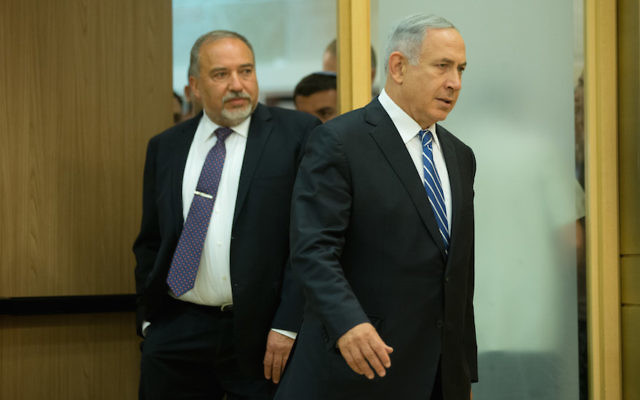Bibi, Lieberman back Arab peace plan
The Israeli government is ready to consider a 14-year-old Saudi Arabian plan for the end of the Israeli-Arab conflict, Prime Minister Benjamin Netanyahu said in an unexpected announcement on Monday.

The Israeli government is ready to consider a 14-year-old Saudi Arabian plan for the end of the Israeli-Arab conflict, Prime Minister Benjamin Netanyahu said in an unexpected announcement on Monday.
Israel has never shown openness to the plan adopted by the Arab League in 2002 for peace between Arab states and the Jewish State – until now. The plan calls for peace in return for a pull-out from almost all land which the Jewish State took control of in 1967 – including territory in Jerusalem – and a “just settlement” for Palestinian refugees.
On Monday, Netanyahu declared: “The Arab peace initiative includes positive elements that can help revive constructive negotiations with the Palestinians.”
He then said: “We are willing to negotiate with the Arab states revisions to that initiative so that it reflects the dramatic changes in the region since 2002, but maintains the agreed goal of two states for two peoples.”
Analysts were surprised. Gadi Wolfsfeld, an expert in political communication from the Hebrew University, told The AJN, “Up until now this initiative has been ignored – this is a change in rhetoric.”
Netanyahu’s announcement came hot on the heels of a speech by Abdel Fattah el-Sisi, president of Egypt, which cited the Israeli-Egyptian peace as inspiration for Israel and the Palestinians and called for Israeli-Palestinian peace. Netanyahu’s announcement had the sound of a response to Sisi, and included acknowledgment of the Egyptian offer to help work towards peace.
Joining Netanyahu at Monday’s press conference, Avigdor Lieberman, Israel’s newly appointed Defence Minister, said the Sisi speech “was very important”.
“It creates a genuine opportunity that obligates us to pick up the gauntlet,” he said. “I certainly agree that in the Arab Peace Initiative there are some very positive elements that will enable us to conduct serious dialogue with our neighbours in the region.”
Wolfsfeld believes that as well as showing appreciation for the Egyptian speech, Netanyahu’s announcement was designed to tone down criticism overseas of his new expanded coalition which includes the rightist Yisrael Beitenu. “It could be to show that despite concerns that Israel has moved to the right, he’s still interested in a two-state solution,” he commented.
The new-found enthusiasm for the Arab Peace Initiative may also be Netanyahu’s attempt to provide an alternative to the new French initiative for Israeli-Palestinian peace. As The AJN went to press, senior politicians from several Western and Arab states were gathering in Paris for the launch of a French attempt at kickstarting the peace process. Invitations were not extended to Israel or the Palestinians, and Israel is concerned that it will become a forum where it is criticised from afar without getting a chance to state its case.
On the Israeli left, Netanyahu’s announcement on the Arab Peace Initiative was received with a grain of salt. Hagit Ofran, one of the leaders of Peace Now, told The AJN that as far as she is concerned it represented “only tactics” and said, “As long as we see his policies on the ground which are counter to the two-state solution and building in settlements it’s difficult to believe this declaration.”
NATHAN JEFFAY

comments